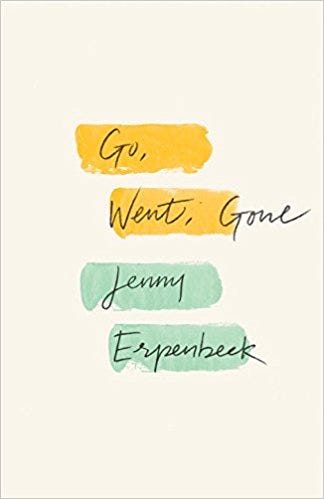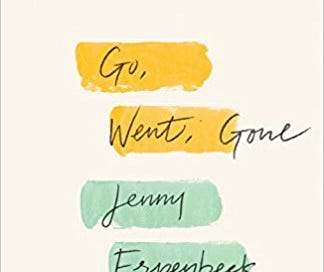I promised another post by the end of April, and I wrote a heady several hundred words two weeks ago about—of all things—the nature of time, but then I closed my laptop and the post disappeared, and then I rearranged all the furniture and logged onto Walt’s Facebook marketplace account to buy a beautiful old dining table and a beautiful old paint-splattered toddler table with a set of wooden chairs in primary colors, turning every room into the house into a dining room, and then I threw an Easter party as an excuse to eat Cadbury mini eggs, or the best holiday candy that exists, and bake this cake, and then the sun came out and I walked a lot and took the toddler to the playground, where he enjoys eating wood chips, and I started running again, and taught my last class of the term, and my student defended her PhD dissertation, and now I’m on the way to California to read at UC-Irvine and—and time went by.
What I had written about before, in a nutshell, was this idea I held throughout graduate school but have recently decided I renounce. The idea was that you were either a time person or a space person, and never both at the same time. This theory was based on nothing more than the fact that I wrote every one of my PhD papers about space—about place, about the domestic, about ideas of region, about work—and found all writing about time basically inscrutable, even though I loved Sharon Cameron’s book about Emily Dickinson, Lyric Time. Nothing anyone said about time made sense to me. It was fun, too, to proclaim things at bars like, I don’t believe in time! or I plan never to age! (ha). In my lost Substack post, from there, I also started writing about Deleuze’s Cinema I and Cinema II, his movement-image and time-image, but I got all muddled about which type I used to think Deleuze preferred, and then I lost it all, probably thankfully.
The gist of it, anyway, was that I’d never thought of myself as a time person. Lately I’ve realized that my posturing was not only posturing but masked something else, something real. It wasn’t that I didn’t ever think about time, or wasn’t interested in it, but that I hated time. I was scared of it. I have a very early memory of a moment just after my grandfather died of cancer, a long slow death—I must have been eight, nine, ten? I remember being in my bedroom, alone, when suddenly and inexplicably a dark gulf opened before me, and what I thought at first was grief made me throw myself face-down onto the bed. But it wasn’t grief—it was fear, fear for myself, and not fear of dying but fear of the time before I died. It was the knowledge that I’d have to get through all that black and empty time. It felt impossible.
I was maybe a strange and unhappy child, and although I got happier in college, my relationship with time remained antagonistic. I disliked memories; I scoffed at nostalgia. Graduate school and trying to be a poet made things worse. I was waiting for someone to publish my book, someone to give me a degree. Not much about my life, about the big things in it, felt in my control. I wrote a seminar paper on Romanticism and impatience (although I still didn’t think I was writing about time). I cannibalized this paper into a chapbook called Essays on Waiting, about the feeling of pushing against time, of wanting it to move forward—of feeling stuck. I got a job and moved to Denver and felt like maybe my life was moving, and then for four years I was miscarrying or in the aftermath of a miscarriage. I was waiting again. I was pushing hard against time, trying to move it forward. I was time’s enemy, or it was mine.
Having a child was the next step in my life, the thing I was pretty (although not entirely) sure I wanted. But I didn’t actually imagine that the work of motherhood would transform my relationship to time in the way it absolutely and unmistakably has. I still retain some antagonism, but now it’s nostalgia-based: I participate fully and sometimes on my own initiative in the time-honored exchange between parents, during which parent one sighs, “It goes by so fast,” and parent two sighs back, “too fast!” Truly, though, it does. It’s more bitter than sweet, but maybe for the first time in my life, memory is a place I want to dwell.
But more: what I love about mothering, the work of mothering, is being in time. When I’m with my son—really with him, not with him and trying to do other things at the same time, like pack a suitcase or peel potatoes or get out the door—I feel myself fully in the flow of time. I am watching the sunbeam in his hair, I am taking the wood chip out of his mouth, I am being led across the yard by the hand, I am scooping him up before he reaches the road, I am comforting him because he is sad about not being let run into the road. I am watching him explore the texture of a strawberry with his fingers at breakfast, laughing with him when he spears it on his thumb. I am sitting down to read the book he’s held out. Warm and thick as that sunbeam, time carries both of us along. And even when I’m not with him, but doing the work of mothering that is done without the baby—laundry, list-making, vacuuming cracker crumbs, putting the tiny pots and pans back in the vicinity of the tiny kitchen—I am aware that I am doing the work that carries us forward, that lets each day follow the other. I am, especially now, anxious about the future. But I don’t dread time itself any more. Often I feel its richness.
This is the most ordinary experience of time, but it is also a fragile one. Here I turn to Jenny Erpenbeck’s Go, Went, Gone, translated by Susan Bernofsky, which I finished a little bit ago. Is this Substack just a Jenny Erpenbeck fangirl account? Perhaps, and it’s because what Erpenbeck sees so well is the fragility of ordinary quotidian time against the forces of history—the fragility, the preciousness, and the smallness of it against the bulldozer of that bigger time. As a novel, Go, Went, Gone shouldn’t work, but it does, and I wish I could quite understand why, but partly it has to do with the real wisdom the book contains about what its retired professor protagonist and its refugee protagonists have in common, which is that their lives are lived out in time that is let unfurl—or not—by a state.


For the professor, who has just retired, time is in his control; he makes his grocery lists, does the seasonal work of upkeep of house and yard according to the pleasurable routines of someone who has lived in one place for years. The death of the professor’s wife means the passage of time is also painful: he has not, for instance, been able to clear away the advent wreath on the table or to open any of the boxes of seasonal decorations carefully labeled by his wife. Still, in the lists and the chores, and even in the professor’s bittersweet acknowledgement of his and his friends’ advancing ages, the fullness of time is present.
This is not the case for the refugees, many from Libya arrived in Germany via Italy via treacherous and deadly Mediterranean crossings, whom the professor befriends. These men cannot work, although to work is what they want most—they are not permitted to work. They can be, and are, transferred from temporary shelter to temporary shelter. They are in the “care” of the state, which means they can be deported at any time. They have fled, in some cases, extreme violence; in almost all, they witnessed horrible deaths along the way. Their time is not their own. Their time is stalled, but a person cannot exist in stalled time. As Erpenbeck writes “Time does something to a person, because a person isn’t a machine that can be switched on and off. The time during which a person doesn’t know how his life can become a life fills a person condemned to idleness from his head down to his toes.”
The fact that our lives are administered, let unfurl in the richness of time—or not—by a state with its inhuman state’s designs is impossible to ignore right now. I think perhaps most of all of Mahmoud Khalil, held without cause and unlawfully and inhumanely in Louisiana ICE detention, who was not allowed to go home for the birth of his first child, a son. My god, the wanton cruelty of this particular stalling. If what I am saying is that a child’s arrival is one of the ways time leaps joyfully forward, then what does it mean that this man was disallowed from the actual living of his life? This is one of the most terrible deprivations I can imagine, the deprivation of time’s forward motion.
Khalil is of course not the only person so deprived. As the particular state in which I live ramps up its campaign of deportations, expulsions, and threats, it is important to understand that this regime is not just, say, moving people around. The problem is not just in the act of taking someone, say, from a life in one place they had chosen and moving them to somewhere worse and unchosen, where they would continue their life. (This in itself would, of course, be bad enough.) Instead, the state in which I live is making time uninhabitable for anyone who now lives in fear for the possibility of their future and their family’s future, for the many many people who I imagine are now unable to dream or plan without fear. It is bringing an essential element of life—the ability to live fully and securely in a life’s time—to a halt.




I read this last night and have been thinking about it since. It’s so beautiful. Thank you for sharing!
Beautiful offering - thank you so much for sharing it with us.